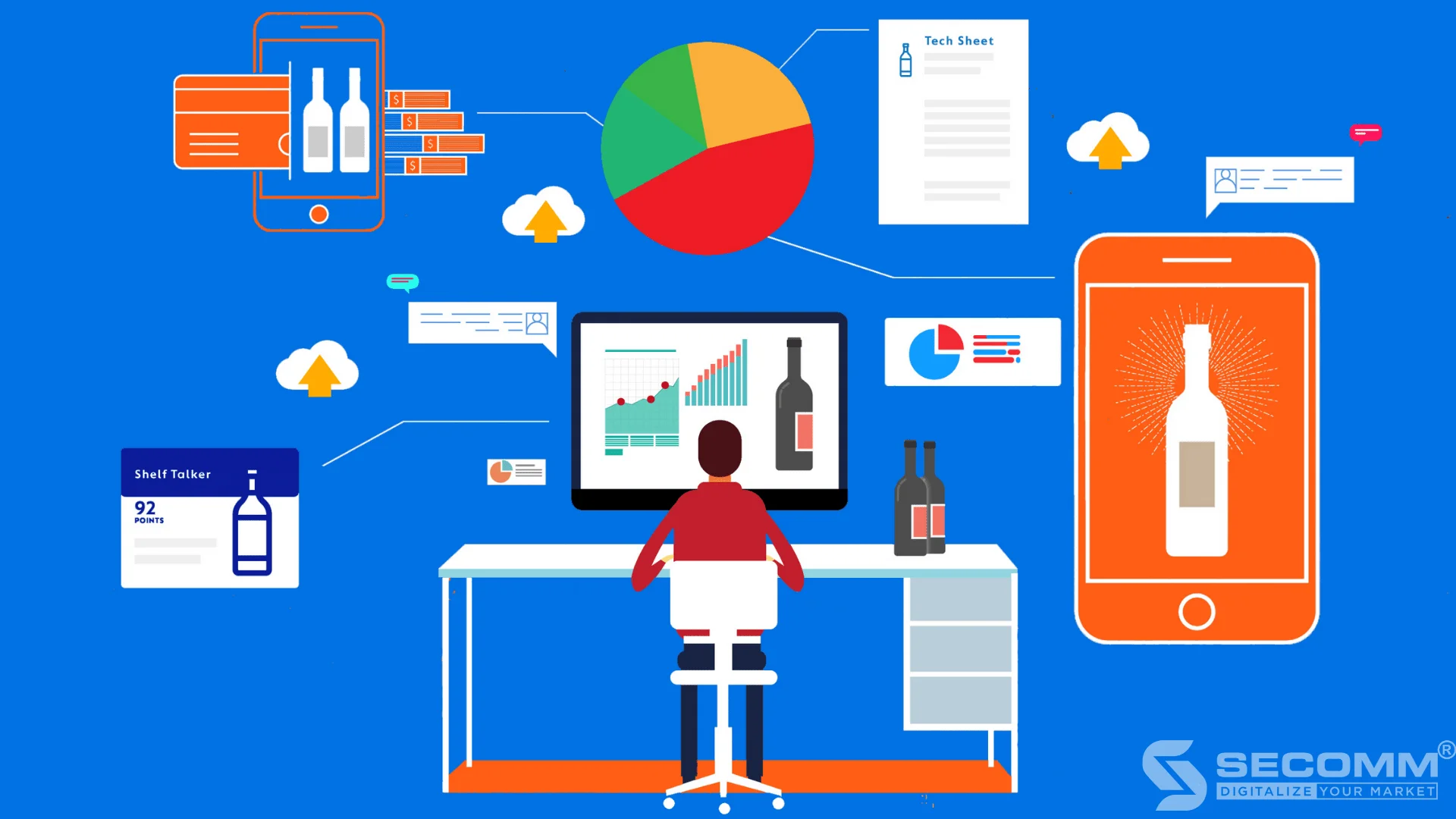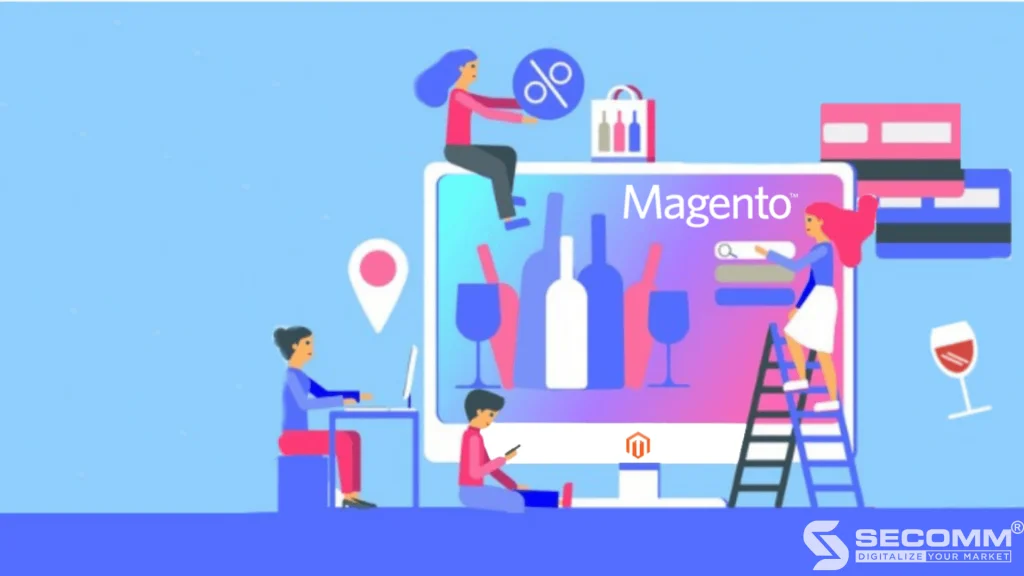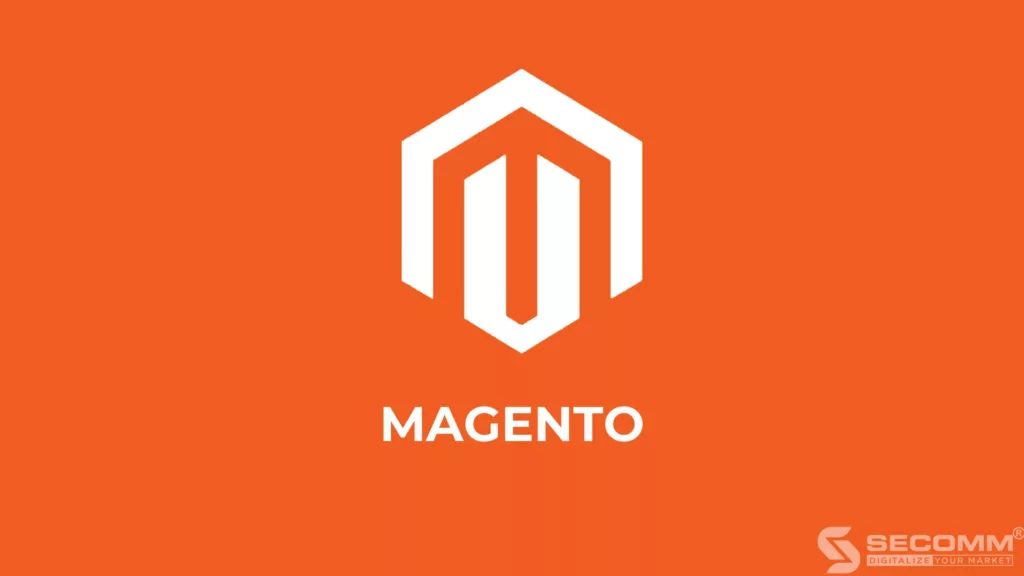It seems we can’t find what you’re looking for. Perhaps searching can help.
Sign Up for newsletter!
Subscribe to get the latest eBook!
Hotline







During the period of digital transformation and the strong impacts of the COVID-19 epidemic on the international markets as well as in Vietnam, the requirement to kick start and expand the eCommerce channel of the wine industry has accelerated faster than ever.
According to Nielsen, contrary to the expectation of a downward trend during the COVID-19 epidemic, the amount of alcohol sold through online stores during the Covid-19 epidemic increased by 27.6%. Particularly in Vietnam, many reports show that wine import volume in the past 3 years has always increased by 10% above average per year and tends to increase rapidly in the coming time, one of the reasons for the increase in wine imports is the changing trend from familiar alcoholic drinks to wine (Thanh Nien News).
However, to seize opportunities and deploy an effective eCommerce system for the wine industry businesses have to choose the most appropriate platform meticulously. Besides the platform that must match with the business model and the business plan, flexibility, and high scalability are the top two most important factors. Out of many highly-rated eCommerce platforms, the open-source Magento platform is well-chosen by many Wine eCommerce giants.
So how did Magento solve the eCommerce problems for the wine industry?

The eCommerce system for the Wine business not only needs to have a neat interface, and match with UX/UI standards but must have a high aesthetics level, and bring out the most unique characteristics of the industry to convey the brand and the production values to the specific customer segment of the industry – customers with “style”.
In addition to investing in high-quality images, arranging the layout scientifically and conveniently, such as the display of new arrivals, best-selling products, and most viewed products right on the homepage of the online store, the interface should reflect the distinctive characteristics of the industry and the unique highlight from the business to the customers.
One of the biggest challenges when implementing eCommerce in the wine industry is the system’s high complexity.
Most eCommerce businesses in the wine industry own a complex category system with a diverse number of products and a variety of product attributes. In addition, to ensure that the eCommerce system is running smoothly and stably with the number of visitors entering the system increasing gradually over time, and spikes during many promotional campaigns, the eCommerce system also needs to be well-designed and built carefully.
Furthermore, many wine business owners often have many sales channels and use many different management software such as POS, CRM, and ERP… this requires eCommerce platforms to be able to integrate, seamlessly and efficiently with third-party software without affecting individual system performance.
This integration also helps businesses overcome the limitations of manual operation, and increase automation for back-office, and sales management processes, ensuring high accuracy and operational efficiency for business operations, and development.
To ensure the development and operation of a complex eCommerce system that meets the above characteristics required the developers of the eCommerce system for the wine industry must be experienced and highly skilled.
One of the most important factors for eCommerce is the customer experience. Especially for the wine industry, which relies on personal interactions to build relationships with customers. However, the digital transformation that has been taking place in the wine industry since the beginning of the Covid-19 pandemic means that the in-store shopping experiences are limited, in exchange for buying wine online through an eCommerce website.
Therefore, businesses need to ensure that they have a product information management system ready, products in stock, pricing displays, well-known brands, various payment options, and delivery services to give customers a complete shopping experience.
Not only have a system that delivers a complete experience on the buyer’s journey, but businesses also need to prepare to personalize the customer experience. Beginning the personalization from the content, the product displacement, to navigating the buyer’s journey will be the key to helping businesses score points in the consumers’ eyes, effectively boosting sales and building Customer Lifetime Value (CLV) for the brand.
This requires businesses to know how to leverage unique data on consumers that has already been calculated and developed by using cutting-edge digital technology to build specific customer profiles, create buying habits that match the consumer’s interest, also provide customized content that matches each consumer’s needs, and bring a unique shopping experience to each customer when buying products on the system.
Nowadays, besides the traditional way of buying goods offline, or through brick-and-mortar stores, shopping through mobile applications as well as through websites has become a common way. Having a business presence on multiple channels – in other words, integrated Omni-channels makes it easy for users to make purchases.
To deliver a seamless multi-channel experience, it is essential to ensure that each channel is optimized for operation, nondisruptively connecting through technological infrastructure improvements. Simultaneously, businesses also need to ensure that they have enough customer information and take full advantage of these data to build distinct competitiveness, ensuring a seamless experience on the system.
In addition, wine businesses must constantly develop technology to accompany generations of customers that have changed over time from the Baby Boomers (1946-1964), Gen X (1965-1980), Millenials- Gen Y (1980-1996), and lastly Gen Z (1997-2002). The customer segments are getting more complex by the day, requiring businesses must have a solid understanding and stay up-to-date with technology to optimize the system to bring the best shopping experience that is most appropriate for each generation.
Related article: Wine eCommerce shines brilliantly in the digital era
Magento is known as one of the leading eCommerce platforms for the wine industry with many outstanding advantages such as an open-source platform with high flexibility, a diverse ecosystem, optimal security, and owning all built-in features from basic to advanced for the eCommerce system.

The Magento platform owns an extensive ecosystem that contains many online features that support business in the wine industry such as managing customer information, handling wine allocation, and controlling inventory, as well as handling orders, etc.
These basic features have been built to help businesses operate an online commerce system without spending too much time designing, and developing special features. So businesses can kick start their eCommerce journey without spending too much time and money right from the start.
The Magento platform is known for its outstanding features and extensions that are developed to meet the rapidly evolving eCommerce market as well as the specialized requirements of each business. Thousands of advanced functions in themes, add-ons, products, Marketing, optimal payment solutions, and shipping,… built with flexibility and high usability have shown remarkable results when integrating into the system, meeting all operational needs, and long-term eCommerce development needs.
The Magento open-source eCommerce platform can accompany businesses with all business models from B2B, B2C, D2C to B2B2C, or from newly operated businesses to businesses that expanding their operating systems. Magento can support businesses to operate and develop, expand into many websites, many countries, multi-currency, and all can be managed on the same system.
Also, Magento has a stable operating system with the ability to handle up to 500,000 SKUs, and thousands of transactions in an hour, so the platform can support businesses operating a stable website that has an increasing amount of traffic over time or a sudden spike during the promotional period.
One of the outstanding features of the Magento open-source platform is the ability to easily integrate with third-party services such as payment, shipping & handling, analytics, and business management software to help operate the eCommerce system. seamlessly and efficiently.
Many eCommerce businesses in general, as well as the wine industry in particular, need secure, flexible, and diverse payment software from domestic cards to international cards to payment gateways (Paypal, Stripe, OnePay, ), e-wallet (Momo, ZaloPay…).
Ex: Trentham Estate, the business has integrated with the Stripe payment gateway to process recurring orders without the need for customers to interact each time with a new order. This has simplified the buying journey as well as the customer experience, helping customers quickly make purchase decisions. The application supports customers effectively on many interfaces and devices, from websites, mobile apps, credit cards, e-wallets, etc.
About shipping and handling, businesses can easily integrate last-mile delivery services and other shipping applications in the markets to help optimize the delivery processes. In addition, businesses can completely customize the delivery modes that are suitable for businesses and customers to get the best shopping experiences.
In addition, wine businesses can develop their delivery options that allow the system to automatically select the corresponding store according to the address provided by the customer, allow orders to be allocated to the nearest warehouse, resulting in higher delivery efficiency, helping customers receive products faster and more conveniently as with businesses The Warehouse has applied for their delivery in everyday business.
Ex: iShopChangi Wine (Singapore) has designed and developed a pick-up feature at the arrival or departure terminal for passengers that are departing, arriving, or transiting at Changi Airpor with their flight information. In addition, customers can also choose “Home Delivery” as long as it’s within Singapore. The system allows all groups of passengers to customize and choose the most convenient pick-up times to get the best out of the shopping experience.
In addition to the ability to integrate diverse payment and delivery methods, many wine businesses are turning to the Magento platform because of the easy integration between this platform and management software such as ERP, and CRM to get a seamless connection of all supply channels from offline to online.
Through the integration of the Magento platform, businesses can overcome the limitations of manual operation and increase the automation of back-office and sales management processes, ensuring high accuracy, and operational efficiency for long-term development.
Besides the built-in analytical tools available on the platform, wine businesses can fully integrate analytics and reporting software such as Business Intelligence (Power BI, Tableau, Looker,…) helping businesses easily analyze and utilise consolidated data, improving business strategy, optimizing the personalized shopping experience while using the system, and growing business, as well as getting the overall view of the business situation more accurately than using manual methods.
iShopChangi Wine website is an eCommerce website specializing in providing many famous wines worldwide with special offers for travellers entering or passing through Changi Airport, especially for the members of Changi Airport Group – CAG (Changi Rewards members) with many attractive promotions.
SECOMM accompanied by iShopChangi Wines begins the improvement starting with the interface, page layout, the product classification. Next, the business optimizes the entire operating system as well as the infrastructure on the existing website to ensure the website operates seamlessly, and stably.
Besides providing operational solutions, the business also focuses on keeping the system unique in terms of both aesthetics in design and the elements of brand development for both CAG and DFS. About functions, the business has developed a complex price calculation, and display system based on many tax principles for alcohol-containing products, as well as classifying customer groups to quickly process orders, as well as optimize the delivery feature at Singapore’s airport and bring the best buying experience.
iShopChangi Wines’ eCommerce system has effectively met the shopping needs of international tourists. The initial complex elements have been simplified into a standard UX/UI interface, and ensure a professional, outstanding overall look of a wine website.
Trentham Estate has been a long-standing Australian brand specializing in wine production and trading since 1988. Throughout the operation, the business has been honoured with hundreds of medals, titles, and significant awards in the wine industry. They were also appreciated for their flexible and creative winemaking method, producing various distinct flavour products.
Since the beginning, Trentham Estate Winery built and maintained a WordPress website to develop and manage all the branding activities. Until 2017, the company decided to switch to the open-source platform, Magento, to build a comprehensive website to be able to provide all wine products with a faster operation and management process.
Trentham Estate Winery and SECOMM built a complete website with the Magento platform to optimize the interface, bringing the unique features of the wine industry to businesses. Next is integrating the payment process with Stripe, and developing delivery on the eCommerce system according to the delivery frequency that suits the customer’s preferences. Finally, building the “Wine Club” program with many incentives for loyal customers, providing the best experiences, and increasing a source of revenue.
The Warehouse stands out from the Vietnamese market as a wine and spirits distributor, which is also one of the An Nam Group’s retail brands (Annam Gourmet Market, The Warehouse, Yves Rocher, Flormar). Since 2001, the brand has spent its efforts to partner with more than 80 well-known wineries worldwide. Those corporations have supported The Warehouse to bring the Vietnam Market high-quality products with peculiarities from parts of the world.
Starting eCommerce with the Magento platform, The Warehouse is extremely focused on fine-tuning the interface, including the Vietnamese and English content, high-quality images, and harmonious website layout for all products on each page, helping businesses show the unique brand’s characteristics as well as the wine industry.
In addition, the enterprise also optimizes user experience and maximizes revenue by developing a product display system with complex categories and attributes, integrating the OnePay payment gateway, also integrating, and synchronizing data from business management software POS, and ERP (Microsoft Dynamics AX) with the Magento platform to limit manual operation, increase automation, and operate all resources and processes flawlessly.
Currently, the business is expanding its business with the Magento platform to meet all the needs of customers across Vietnam.
eCommerce is an inevitable trend as well as a “weapon” for wine businesses to break the market limits. This is a good opportunity for wine businesses to quickly grasp, develop, and expand their business models. To start their eCommerce journey, wine businesses can choose to build their system with Magento, an open-source eCommerce platform.
Magento, an open-source eCommerce platform, is a suitable platform for the wine industry with all business models such as B2B, B2C, and B2B2C. With all of the advantages of having a lot of features from basic to advanced, diverse ecosystems, scalability, and the flexibility of the Magento eCommerce platform, wine businesses can completely design a website that meets all requirements and delivers the ultimate online shopping experience.
In addition, businesses can easily change and develop specialized features according to product characteristics to keep up with the rapid changes in the market and develop long-term goals. That is also one of the main reasons that many wine businesses have chosen the Magento platform to go hand in hand, such as The Warehouse, iShopChangi Wines, and The Trentham Estate Winery.
SECOMM has significant experience developing complicated Wine eCommerce websites in different countries, and we know the challenges that businesses face when selecting and implementing an eCommerce platform.
Contact SECOMM for a free consultation on eCommerce website development!
Read more: 5 eCommerce platforms for the wine industry businesses
 2
2
 10,066
10,066
 0
0
 1
1Subscribe to get the latest eBook!
Hotline